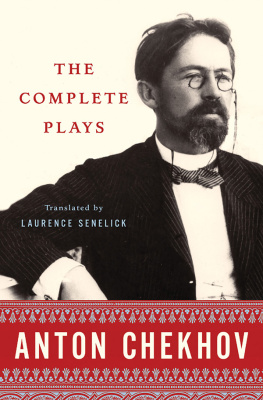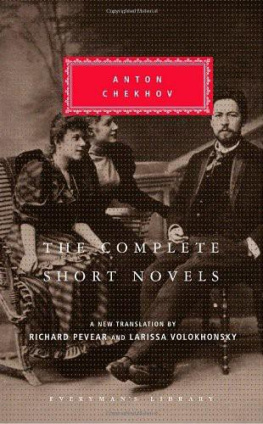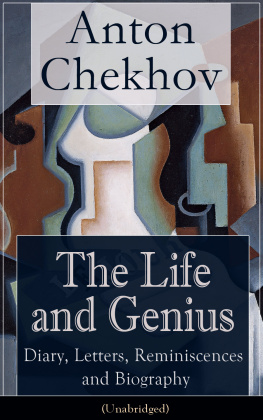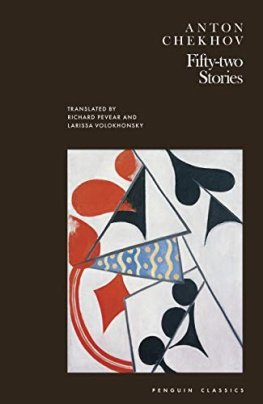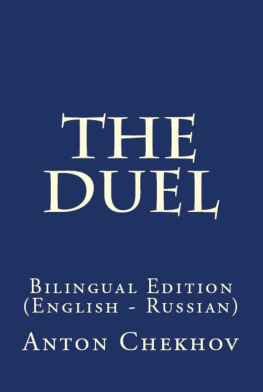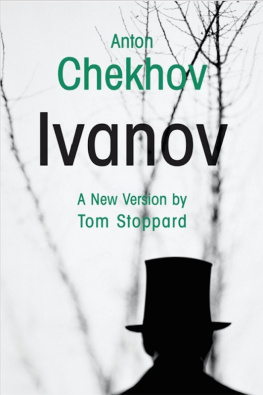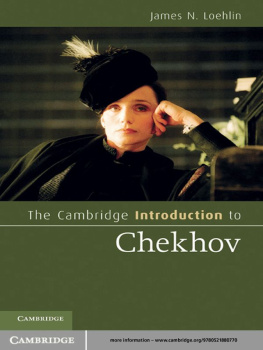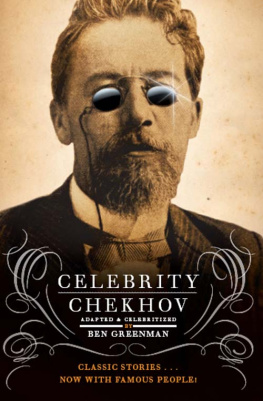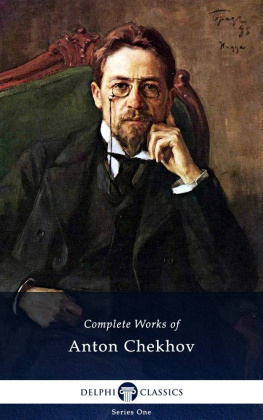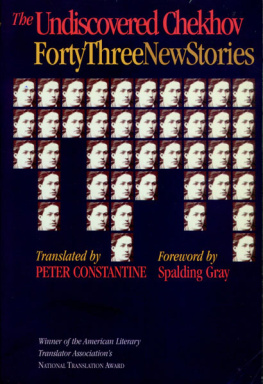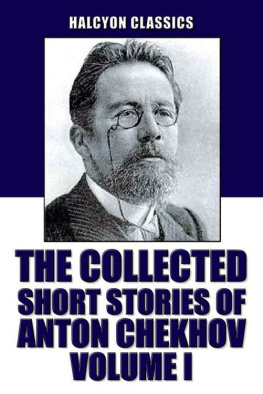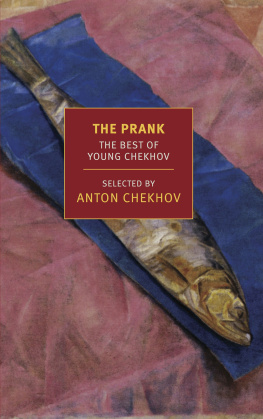
ALSO BY LAURENCE SENELICK
Russian Dramatic Theory from Pushkin to the Symbolists
Anton Chekhov
The Chekhov Theatre:
A Century of the Plays in Performance
Russian Satiric Comedy (translator)
Russian Comedy of the Nikolaian Era (translator)
Gordon Craigs Moscow Hamlet
Serf Actor: The Life and Art of Mikhail Shchepkin
National Theatre in Northern and Eastern Europe (editor)


Frontispiece: Reprinted by permission of Time & Life Pictures/Getty Images.
Copyright 2006 by Laurence Senelick
All rights reserved
First published as a Norton paperback 2007
For information about permission to reproduce selections from this book, write to Permissions,
W. W. Norton & Company, Inc., 500 Fifth Avenue, New York, NY 10110
Book design by JAM Design
Production manager: Devon Zahn
The Library of Congress has cataloged the printed edition as follows:
Chekhov, Anton Pavlovich, 18601904.
[Plays. English]
The complete plays / Anton Chekhov; translated, edited, and annotated by Laurence Senelick.1st ed.
p. cm.
ISBN 0-393-04885-3 (hardcover)
1. Chekhov, Anton Pavlovich, 1860-1904Translations into English. I. Senelick, Laurence.
II. Title.
PG3456.A19 2006
891.723dc222005024362
ISBN 978-0-393-29292-3 (e-book)
ISBN 978-0-393-33069-4 pbk.
W. W. Norton & Company, Inc.
500 Fifth Avenue, New York, N.Y. 10110
www.wwnorton.com
W. W. Norton & Company Ltd.
Castle House, 75/76 Wells Street, London W1T 3QT
These translations are dedicated to the directors, designers, casts, and crews of all the productions of their earlier versions, who, from 1967 to the present, have demonstrated that fidelity to an author and stageworthiness are not incompatible qualities .

CONTENTS
C omplete is a weasel word. No sooner does a complete edition of anything appear than it is trumped by new discoveries. However, if one may modify an absolute, this edition is the most complete collection of Anton Chekhovs plays in English. It contains all the plays performed during his lifetime and posthumous works, performed or not. The former include the first version of Ivanov, never before translated into English, and the latter the farce by Ivan Shcheglov cobbled together from his collaboration with Chekhov, which has never been published in any language since 1911.
I have also included a number of dialogue pieces that Chekhov wrote for comic journals in the 1880s. Throughout that decade, Chekhov published stories which are virtually one-act plays or monologues and which he often called scenelets ( stsenki ). They were frequently adapted for the stage. The Moscow Art Theatre, for instance, played Surgery, a dialogue between a country doctor and a sexton, as one of its recital pieces; and other stories, such as The Witch and Robbers, were produced by the Art Theatre studios and amateur groups. I have chosen not to list these stories among his plays, because they were not typographically distinguishable as such, and because they are readily available in collections of Chekhovs prose. Similarly, I have not included the dialogue captions he wrote to cartoons, since these make little sense without their drawings. On the other hand, I have included every journalistic squib that he did write in the form of a play, including his parodies of popular drama.
This edition contains a number of features intended to improve the readers understanding of Chekhov and his writing. First, the plays are heavily annotated, not merely to provide explanations of obscure names and terms, but also to point out jokes and subtleties in the original and to explain why I made the translation choices I did.
Next, I have included a choice of variants. Plays in pre-Revolutionary Russia had to undergo two censorships, one for publication and one for performance. Occasionally, the censorship required deletions or rewrites of lines that, in the case of speeches about Arkadinas liaison with Trigorin in The Seagull or Trofimovs remarks about social conditions in The Cherry Orchard, were never restored in Chekhovs lifetime. In other cases, such as in Ivanov, Chekhov kept tinkering with the play for years, the final published version being quite distinct from the two different stage versions of 1887 and 1888. Often a Chekhov play will have been published in a magazine before it was produced, or, in rehearsal, the director required or suggested changes. For example, it was Konstantin Stanislavsky who insisted that Act Two of The Cherry Orchard end with a love scene between Anya and Trofimov. Here the variants may coincide more exactly with Chekhovs ideas than the final versions do. The fewest variants appear in Uncle Vanya, since it was a thoroughgoing revision of a pre-existing play, The Wood Goblin .
I have seen no reason to include variant inversions of words or minor changes that do not involve the sense and would be of interest chiefly to Slavic specialists who have access to the Russian originals. Those interested in the minutiae can consult the notes to Ronald Hingleys Oxford Chekhov . However, I have left in anything that can provide more information about a character or an insight into Chekhovs working methods. Except when the changes were made at the instigation of third parties, I do not recommend spatchcocking these remnants from Chekhovs waste-paper basket back into the plays. He was a shrewd editor of his own work, regularly deleting lines that were too explicit or repetitive or caricatural. In his case, less is definitely more.
Over the years, my translations of Chekhov have benefited greatly from the directors and companies who have staged them. My thanks go to all of them for enhancing my understanding. Of the many individuals, scholars, and theater people who deserve my gratitude, I shall name only Martin Andrucki, John Emigh, Donald Fanger, Spencer Golub, Andr Gregory, Michael Henry Heim, John Hellweg, Simon Karlinsky, Nils ke Nilsson, Emma Polotskaya, Sasha Popov, Herta Schmid, Virginia Scott, Julie de Sherbinin, Anatoly Smeliansky, Jurij Striedter, Richard Trousdell, and the late Irene Worth.
A nton Pavlovich Chekhov was born in the town of Taganrog on the sea of Azov in southern Russia on January 17, 1860,
The talent was displayed in church. Beyond running a small grocery store where his sons served long hours In my childhood, there was no childhood, Anton was later to report Pavel Chekhov had a taste for the outward trappings of religion. This was satisfied by unfailing observance of the rites of the Eastern Orthodox Church, daily family worship, and, especially, liturgical music. He enrolled his sons in a choir that he founded and conducted, and he aspired to be a pillar of the community.
Taganrog, its once-prosperous port now silted up and neglected, had a population that exceeded fifty thousand during Chekhovs boyhood. Its residents included wealthy Greek families, the ship-building interests, and a large number of Jews, Tatars, and Armenians. The town benefited from such public amenities of the tsarist civil administration as a pretentious-looking gymnasium, which the Chekhov boys attended, for one of Pavels aims was to procure his children the level of education needed for entry into the professions. The upward mobility of the Chekhov generations is reflected in the character of Lopakhin in The Cherry Orchard, a self-made millionaire whose ancestors had been serfs on the estate he succeeds in purchasing. Chekhovs father, born a serf, had risen from meshchanin, or petty bourgeois, to be the member of a merchant guild; and Chekhov himself, as a physician and writer, became influential on the national scene. He was a model of the raznochinets, or person of no settled rank, who began to dominate Russian society in the latter half of the nineteenth century.
Next page
